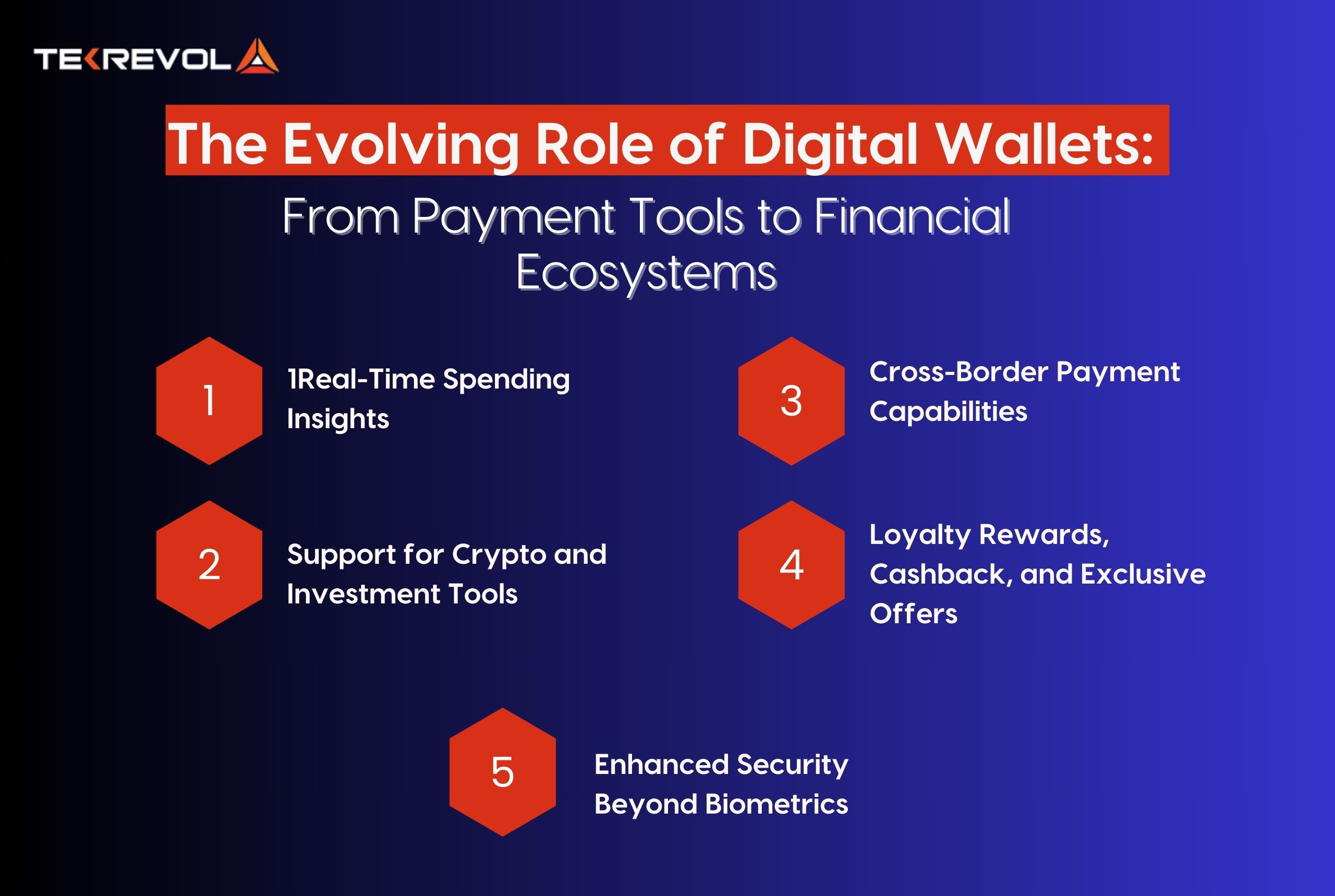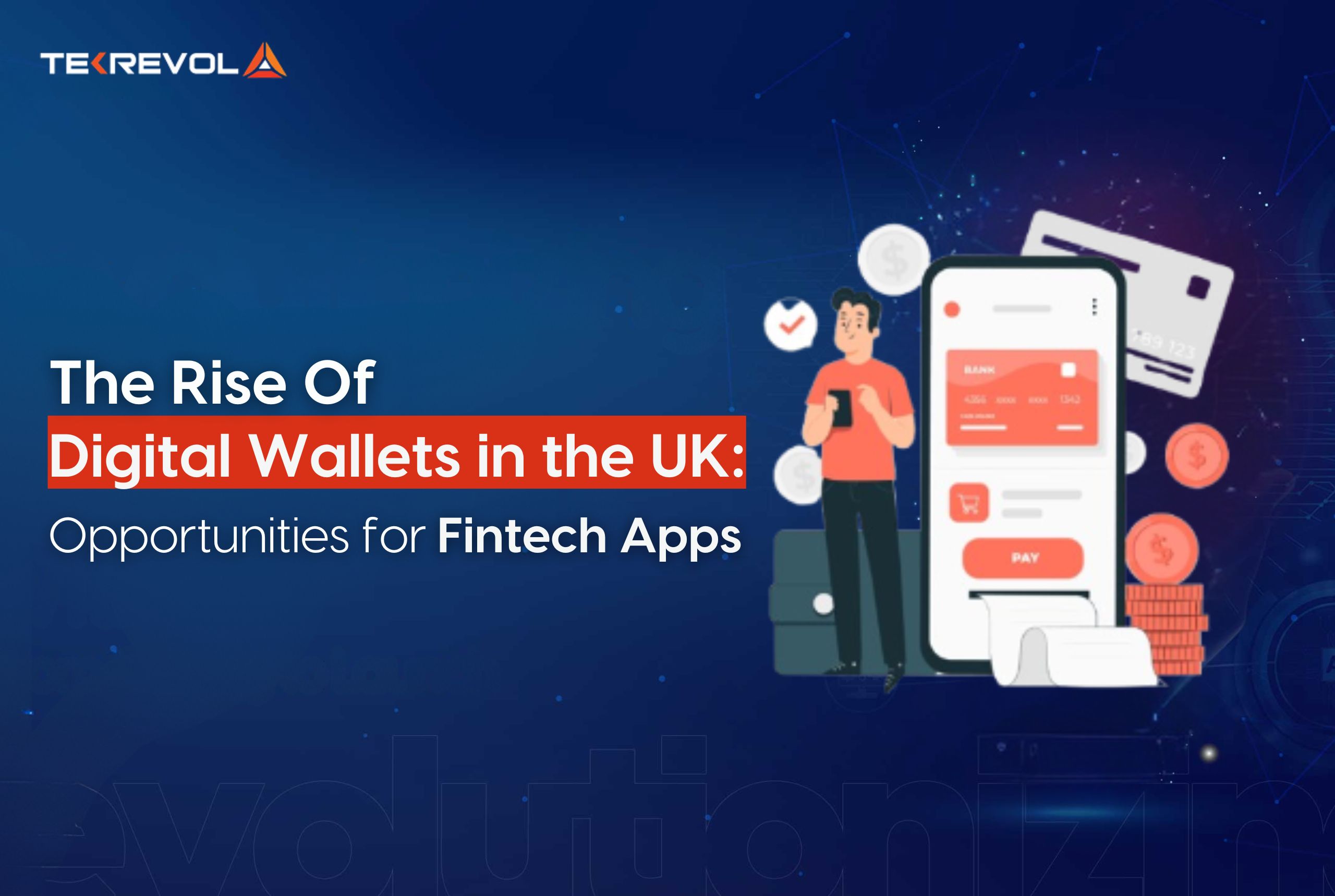Be honest, when was the last time you actually needed your wallet? These days, your phone does it all. Buying a coffee, catching a cab, or splitting a tab is just a tap away with Apple Pay, Google Pay, or PayPal. And it’s not just you, about 40% of UK consumers are already using mobile payment apps regularly. That’s a clear sign of where things are headed.
What’s even more telling? The mobile payments market in the UK was valued at £2.12 billion in 2024, with forecasts indicating it will reach £11.5 billion by 2033.
But here’s the exciting part: it’s not just great for users. Fintech innovators have a huge opportunity right now. As digital wallets grow beyond basic payments into all-in-one financial platforms, there’s a real chance to create smarter, more secure, and highly personalised app experiences.
Whether it’s helping users track their spending, manage crypto, or send money abroad without hassle, digital wallets are stepping up big time. Everyone’s trying to build the most intuitive, all-in-one wallet, and the race is officially on.
If you’re planning to build a digital wallet app or fintech app, now is the ideal time to make your move. To bring that vision to life, partner with a reputable fintech app development company that truly understands the technology, the trends, and, most importantly UK market.
In this blog, we will explore the latest digital banking trends, examine the growth of the fintech sector in the UK, and uncover the exciting opportunities available for businesses looking to innovate in this space.
An Overview of the Digital Wallet Ecosystem in the UK
Mobile payments apps in the UK have witnessed substantial uptrends that have given rise to happenings such as customer expectations, rapid smartphone adoption, and rapid technology advancements.
- Recently, reports have found that almost 4 in 10 UK consumers routinely use a mobile wallet, and this percentage seems to be growing.
- 38% of consumers in the UK make frequent use of mobile wallets as of 2023; that will continue increasing every year.
- According to Juniper Research, over 60% of the global population is projected to use digital wallets by 2026.
Thus, customers today expect something other than sheer convenience; they seek a complete solution for managing their money, investing, and even tracking their everyday spending. The result of this shifting consumer behaviour is an invitation for fintech companies to come in with their innovations.
Understanding Digital Wallets
Digital wallets are basically applications and web-based platforms which are secure digital mechanisms that allow users to store any type of payment information and carry out transactions from their devices, like smartphones, tablets, or computers.
Fintech app solutions help users make seamless and contactless payments, taking over the need to carry cash or cards. Some famous examples are Apple Pay, Google Wallet, PayPal, and Paytm.
Key Features of Digital Wallets:
- Convenience: Payments are made instantly through the use of QR codes, NFC, or any other type of barcode.
- Security: These platforms comprise high-tech security features like encryption, biometrics, and tokenisation for the protection of user data.
- Integration: Digital wallets are often integrated with bank accounts, loyalty programs, or other financial-related tools for a more seamless financial experience.
The Role of Younger Generations in Adopting Digital Wallets
Younger generations play an important role in digital wallet adoption:
- A substantial percentage of Gen Z prefers to make payments using only their smartphones rather than carrying a physical wallet.
- These generations feel comfortable with mobile banking, instant money transfer, and digital finance tools, which makes them natural e-wallet adopters.
However, the trend is beyond the young ones; older adults are catching up in using digital wallets due to their ease of operation and additional security.
The Evolving Role of Digital Wallets: From Payment Tools to Financial Ecosystems

Digital wallets have now evolved beyond merely storing credit card details and making contactless transactions. It is no longer just an electronic version of one’s physical wallet; it is transforming rapidly into an all-inclusive financial ecosystem wherein you can manage everything, including your personal finances, investments, rewards, and security from one single point.
It’s not merely a passing trend but a direct outcome of evolving consumer needs and emerging technological capabilities.
1. Real-Time Spending Insights
Today, modern digital wallets delve much deeper when it comes to providing real-time insights into spending behaviour. With features like category-based spending breakdowns and personalised budgeting tools, users can quickly see where their money goes, set limits, and get notifications to stay financially healthy, something traditional banking apps often lack.
2. Support for Crypto and Investment Tools
Nowadays, Most digital wallets leverage cryptocurrency as another way of buying and selling digital assets, allowing users to keep a balance in their traditional currency. Some crypto wallets even look into micro-investing by utilising access to EETFS stocks, or even fractional shares, enabling users to invest with the smallest amounts as accessible as possible to reach financial growth.
3. Cross-Border Payment Capabilities
Gone are the days when you had to pay exorbitant fees and wait for long periods to transfer money across borders. Cheap and quick international money transfer is a game-changer for global freelancers, remote workers, and families who are financially supporting relatives abroad.
4. Loyalty Rewards, Cashback, and Exclusive Offers
Today’s wallets are converting into reward platforms. Today’s wallets will also reward customers with loyalty points, cashback offers, or even personalised discounts through an integrated partnership with merchants. Hence, by pooling all the rewards and making them redeem instantly, this will add to the value of routine transactions.
5. Enhanced Security Beyond Biometrics
Security today is more than just the simple aspects of passwords and PINS. With modern wallets, biometrics like fingerprint scans and face detection will also serve as biometric identification or voice recognition to give users a better security level. Real-time fraud detection, along with tokenisation, also gives users an even more secure and smooth payment journey.
How Digital Wallets Are Reshaping UK Retail: Key Business Adaptations
As wallets are mainstreaming, UK retailers and service industries are under increasing pressure to modernise their customer interactions at the point of sale. Here are the changes rapidly being adopted by these businesses:
1. Modernising Checkout with NFC and Mobile Payment Tech
To meet customer demand for faster and more convenient transactions, businesses have implemented a range of upgrades to their payment systems. Some NFC-enabled payment terminals have now been placed in place of or in addition to their traditional card readers, while others allow mobile wallets such as Apple Pay and Google Wallet.
Example:
With Apple Pay and Google Wallet, retailers now offer seamless transactions at self-checkouts and staffed tills, allowing customers to complete payments instantly without a card or PIN. Even small businesses are catching on.
2. Boosting Loyalty Through Wallet-Integrated Rewards
Retailers are transforming loyalty systems by integrating them directly into digital wallets. There is no card or printed coupon involved; customers can immediately avail rewards and offers right from their phones.
Example:
Retailers are now linking their loyalty schemes to digital wallets, so customers can simply scan their phones at checkout to collect rewards and enjoy exclusive discounts, eliminating the need to search for physical cards.
Such integration increases redemption rates while enhancing customer engagement through personalised experiences in real-time.
3. Creating a Seamless Omnichannel Payment Journey
In response to the increasingly fluid movement of consumers between online and offline shopping, brands have begun to embrace omnichannel payment strategies that enable seamless digital wallet acceptance across all touchpoints.
For example:
Brands allow customers to pay both on the website as well as in-store using Apple Pay and Google Wallet. This unbroken experience leads to quicker checkouts, reduced cart abandonment, and, above all, satisfies the expectations of today’s mobile-first shoppers.
Food delivery services like Deliveroo allow customers to pay using digital wallets for orders placed on the app or the website, an omnichannel service-given that an approach like this has fairly well become a norm in the food and beverage industry.
- Have a fintech idea but need expert execution?
- We help you create seamless, compliant, and innovative Fintech apps.
Opportunities in Financial Innovation: The Rise of Digital Wallets
While digital wallets revolutionise payment conventions, their capacity extends far beyond replacing physical cards. The Financial Conduct Authority (FCA) and Payment Systems Regulator (PSR) are just some of the industry leaders beginning to realise that digital wallets are becoming comprehensive financial ecosystems. This transition sets the stage for exciting innovation across various industries.
1. Expanding Payment Horizons: Beyond Card Networks
Digital wallets enable new methods of payment, creating a fresh wave of innovations and competition within finance. Here is how digital wallets change the world of transactions:
Account-to-Account Payment: A new form of online payment, wallet-to-wallet bank transfers, allows users to send money directly between accounts without relying on card networks, offering quicker processing, lower costs, and enhanced transparency.
Cryptocurrency Integration: The trend in digital assets has led many wallets to add crypto support, allowing users to pay and store crypto and offering services such as blockchain payments and DeFi. Encorp.io, among others, is leading this trend.
Buy Now, Pay Later (BNPL): The BNPL schemes incorporated within digital wallets give consumers, the abilty to manage expenditure, allowing them to pay for purchases in instalments.
2. Building Comprehensive Financial Hubs
Digital wallets are now developing into all-in-one financial hubs that help consumers manage their money effortlessly:
Digital Identity Management: Wallets provide secure storage of digital identities, ensuring smooth KYC and AML compliance for streamlined financial service delivery.
Personal Finance Management (PFM): Some finance management tools are offered by many wallets, which let the user track their spending and budgeting, helping them to understand and improve the decisions they make concerning finances.
Investment Portfolio: Some wallets add investment features and allow one to invest in stocks, ETFS, etc., thereby equipping wallets for normal spending and wealth accumulation.
Insurance & Lending Services: Insurance and loan products through wallets facilitate easy access to financial services and provide the user with fast and efficient ways to deal with their financial needs.
3. AI-Driven Security: The Future of Fraud Prevention
Security has become the foremost priority for digital wallets, and AI has become an integral part in enhancing fraud prevention.
Behavioural Biometrics: AI observes unique patterns of its users in terms of action-typing speed, gestures, etc. and creates a profile to secure users. Any destruction from it will trigger further security checks and authentication.
Real-Time Transaction Monitoring: AI keeps an eye on the events of transactions and picks suspiciously unusual patterns such as high-value purchases or spending beyond normal.
Predictive Fraud Detection for Wallets: Those based on machine learning will predict transactions that are fraudulent as per the historical data so that i,nterventions can occur immediately.
Adaptive Authentication: AI modifies the level of authentication according to the transaction risk. Low-risk transactions might need a PIN whereas, ,in case of a high-risk transaction, one would need more secure verification.
Trends that Will Shape the Future of Digital Wallets
As fintech apps continue to evolve, the future of digital wallets in the UK will mainly be sculpted by various trends:
Open Banking Integration
Open Banking, with its ability to allow third-party providers to view bank data securely, will become a huge factor in the fight for digital wallet survival. Incorporating Open Banking functionality would enable converters to give a more rounded view of a user’s financial life, including savings, investments, and even credit scores, via just one app.
AI and ML
AI and ML technology have become the backbone of personalising a user’s experience. By using predictive analysis to allow for longer purchase windows and enabling AI-driven financial advisory services, digital wallets are poised to gain even more significance.
Contactless Payments and NFC Technology
Contactless payment acceptance continues to rise in popularity, and this trend would appear to be on a strong path for expansion in the years to come. Near-Field Communication (NFC), a technology that allows the user to simply tap their phone for fast and secure payment, has been well developed.
Therefore, the integration of NFC capacities in fintech applications will provide end-users with far greater speed and seamlessness when completing their payments.
Sustainability Features
As consumers become more familiar with sustainability concepts, so do their preferences for which services can be considered sustainable. Fintech apps that include carbon footprint tracking and prizes for eco-friendly purchases will undoubtedly appeal to environmentally conscientious people looking for credibility with larger social sustainability initiatives.
Challenges and Regulatory Considerations in the Rise of Digital Wallets
Digital wallets have enormous potential, but they have to overcome various hurdles to develop a technically solid, free, and fair ecosystem. The challenges and regulatory considerations can be summed up as such:
1. Competition Issues
With digital wallets flourishing, concerns are being raised about market power and competition from the largest tech actors in the field, namely Apple and Google. These new players may do certain things that raise anti-competitive issues about the digital wallet market:
Interoperability: The nonexistence of interoperable designs offered by various wallet platforms is one major question. Consumers may not be able to use one wallet on multiple platforms, therefore limiting their choice and creating a barrier for new competitors.
Data Access: Control of consumer data by wallet providers raises some questions. While keeping the competition environment fair, wallet providers should extend fair access to third-party developers.
Fees: Also, making fees for digital wallets transparent and just is a way to avoid monopolistic practices and ensure consumers are not abused.
To investigate these concerns, the FCA, PSR, and Competition and Markets Authority (CMA) are taking matters into their own hands under the Digital Markets, Competition, and Consumers Act (DMCCA).
2. Consumer Protection
As digital wallets enter an ever-increasing number of day-to-day financial transactions, consumer protection remains ever at stake:
Data Privacy: Protecting the user data is key. Digital wallet providers must strictly observe data privacy laws such as the GDPR to protect sensitive information.
Fraud Prevention: Strong anti-fraud mechanisms must be in place to secure users from unauthorised transactions and scams. Without these, consumers with digital wallets may be put at risk.
Dispute Resolution: Clear dispute resolution mechanisms exist to examine the issues or complaints of the users quickly and fairly.
Financial Literacy: Knowledge on digital wallets- how they work, the risks involved, and advantages to be provided to users to ensure responsible usage and thereby reduce incidences of scams or mistakes.
Operational Resilience
The operational resilience becomes critical when one depends mostly on digital wallets for having reliable service delivery, on the stability and security of their services :
Systems Outage: Wallet services should always be available and reliable. Any outages could hamper financial transactions and block access to cash, which could cause major issues for customers.
Cybersecurity: Wallet vendors need to invest in strong cybersecurity so that they can defend against malicious cyber incidents, such as data breaches or other attacks, which may expose the information of users.
Data Backup and Recovery: All of these are critical components of effective backup and recovery systems that must be in place in the event of a system failure or cyber attack so that customers can be certain that their financial data is safe and recoverable.
Regulatory Framework
It raises queries on the capability of the existing regulatory framework according to the speeding process of advancement in the digitised wallet:
Clarity and Consistency: A clear and consistent regulatory framework will be imperative for providing certainty to businesses within the digital wallet space.
Innovation-Friendly Regulation: The goal is to strike a balance between safeguarding users and fostering innovation, but heavy-handed regulations risk limiting the digital wallet market’s potential.
TekRevol: Your Trusted Partner in Fintech App Development
Having rich experience of over 8 years in fintech app development, TekRevol helps businesses construct secure-to-scale-and-user-friendly financial technology solutions. From mobile payment apps to blockchain integration, and digital wallet app development, our speciality is making applications according to customers’ needs to transaction link and user experience improvements.
Being a leading app development company in the UK, security ty is our number one priority. We install cutting-edge encryption technology and biometric authentication and implement industry standards such as GDPR and PCI-DSS to protect sensitive user data. Our user-centric design makes every app not only secure but also easy and intuitive to navigate.
TekRevol offers end-to-end development services to help your business thrive, whether you’re integrating a digital wallet, creating a lending platform, or exploring blockchain solutions in the rapidly evolving fintech world.
- Need a custom fintech app?
- Trust TekRevol to deliver secure and user-friendly solutions.







![What is Visual Regression Testing [2025 Definitive Guide]](https://d3r5yd0374231.cloudfront.net/images-tek/uploads/2025/11/Feature-19.jpg)



